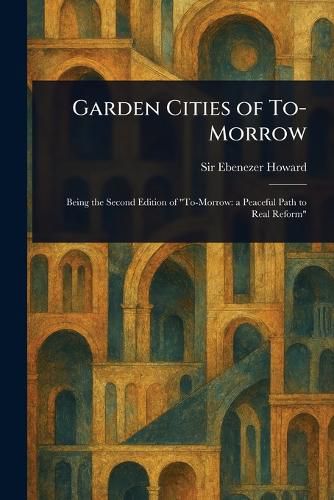Readings Newsletter
Become a Readings Member to make your shopping experience even easier.
Sign in or sign up for free!
You’re not far away from qualifying for FREE standard shipping within Australia
You’ve qualified for FREE standard shipping within Australia
The cart is loading…






This title is printed to order. This book may have been self-published. If so, we cannot guarantee the quality of the content. In the main most books will have gone through the editing process however some may not. We therefore suggest that you be aware of this before ordering this book. If in doubt check either the author or publisher’s details as we are unable to accept any returns unless they are faulty. Please contact us if you have any questions.
Ebenezer Howard's "Garden Cities of To-Morrow," subtitled "Being the Second Edition of To-Morrow: a Peaceful Path to Real Reform," is a landmark work in urban planning and social reform. This influential book outlines Howard's visionary concept of garden cities, designed to combine the advantages of both urban and rural living. A key text in the history of urban design and city planning, it explores the potential for creating self-sufficient communities that offer residents access to green spaces, employment opportunities, and a high quality of life. Howard's ideas sparked an international movement, impacting urban development for decades to come. This meticulously prepared print edition offers readers the opportunity to engage directly with Howard's original arguments and proposals. Explore the foundations of garden cities and their lasting impact on social sciences, architecture, landscape design, and the ongoing quest for better urban environments.
This work has been selected by scholars as being culturally important, and is part of the knowledge base of civilization as we know it.
This work is in the public domain in the United States of America, and possibly other nations. Within the United States, you may freely copy and distribute this work, as no entity (individual or corporate) has a copyright on the body of the work.
Scholars believe, and we concur, that this work is important enough to be preserved, reproduced, and made generally available to the public. We appreciate your support of the preservation process, and thank you for being an important part of keeping this knowledge alive and relevant.
$9.00 standard shipping within Australia
FREE standard shipping within Australia for orders over $100.00
Express & International shipping calculated at checkout
This title is printed to order. This book may have been self-published. If so, we cannot guarantee the quality of the content. In the main most books will have gone through the editing process however some may not. We therefore suggest that you be aware of this before ordering this book. If in doubt check either the author or publisher’s details as we are unable to accept any returns unless they are faulty. Please contact us if you have any questions.
Ebenezer Howard's "Garden Cities of To-Morrow," subtitled "Being the Second Edition of To-Morrow: a Peaceful Path to Real Reform," is a landmark work in urban planning and social reform. This influential book outlines Howard's visionary concept of garden cities, designed to combine the advantages of both urban and rural living. A key text in the history of urban design and city planning, it explores the potential for creating self-sufficient communities that offer residents access to green spaces, employment opportunities, and a high quality of life. Howard's ideas sparked an international movement, impacting urban development for decades to come. This meticulously prepared print edition offers readers the opportunity to engage directly with Howard's original arguments and proposals. Explore the foundations of garden cities and their lasting impact on social sciences, architecture, landscape design, and the ongoing quest for better urban environments.
This work has been selected by scholars as being culturally important, and is part of the knowledge base of civilization as we know it.
This work is in the public domain in the United States of America, and possibly other nations. Within the United States, you may freely copy and distribute this work, as no entity (individual or corporate) has a copyright on the body of the work.
Scholars believe, and we concur, that this work is important enough to be preserved, reproduced, and made generally available to the public. We appreciate your support of the preservation process, and thank you for being an important part of keeping this knowledge alive and relevant.